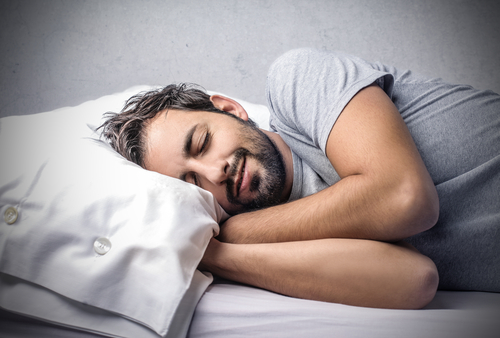Are you someone that has a hard time falling asleep? Do you toss and turn all night, trying not to see what time the clock says? Or do you fall asleep easy but have a hard time staying asleep? If sleeping issues plague you, you’re definitely not alone.
According to the Centers for Disease Control and Prevention (CDC), more than one-third of U.S. adults routinely get less than 6 hours of sleep each and every night. That’s not good, because a lack of quality sleep can and does negatively impact our physical, mental and emotional health.
The good news is, there are some lifestyle changes we can make to start getting a good night’s sleep. If that sounds like something you want to do, then read this entire blog post to get some ideas on how you can start catching more Zzzzzzs.
- Set Up a Sleep Routine
Your body learns when it can and can’t sleep and we often send it mixed signals by not going to bed at the same hour or getting up at the same hour. I know it’s tempting to stay up late and sleep in late on weekends, but this can really screw up your body clock.
Going to bed and getting up at the same time every day, including weekends and, yes, even holidays, will help your body establish a healthy sleep cycle so it knows exactly when to sleep and when to be alert.
- Move Your Body
You know that frequent exercise is good for your heart and muscles, but did you know that moving your body can also help you get a good night’s sleep? Researchers in Northwestern University’s Department of Neurobiology and Physiology found that getting aerobic exercise just four times a week can significantly improve the quality of your sleep.
Something important to note is that you should be sure to not exercise right before bedtime, but rather have several hours in between so that your body is not too revved up to fall asleep.
- Eat Sensibly
If you’re one of those people that requires caffeine to help you get going in the morning, that’s understandable. Just be sure that you STOP drinking caffeinated drinks (or eating chocolate) by mid-afternoon, or that caffeine could DEFINITELY keep you awake at night. Also, don’t eat right before bedtime, especially not spicy foods, as this can cause heartburn and keep you awake.
- Quit Smoking
You know that smoking is not good for you, but you may not know that it affects your sleep. One study found that smokers are 4x more likely to feel unrested – even after a full night of sleep – than nonsmokers. The researchers attribute this to the fact that nicotine has a stimulative effect, which your body becomes addicted to. At night, while your body is not sleeping, it is actually having withdrawal symptoms, causing you to toss and turn, or wake up altogether. Smoking is also a major influencer of breathing disorders such as asthma and sleep apnea, which can make it difficult to get a restful night of sleep.
- Watch That Alcohol
There is a myth that a nightcap will help you get a great night of sleep, but that’s exactly what that is, a myth. While alcohol can help us fall asleep, it actually disrupts our pattern of sleep and brainwaves, causing us to toss and turn all night. Typically, people who drink quite a bit before bed fall asleep easily because they essentially black out, then wake up two hours later and have a hard time falling back to sleep. It’s fine to have a cocktail or glass of wine with dinner, but limit your intake and be sure you allow a few hours of sleep in between consumption and bedtime.
- Put Those Tech Gadgets Away
A National Sleep Foundation (NSF) survey found that nearly all participants used some type of electronics, like a television, computer, video game, or cell phone, within the last hour before going to bed. Here’s why that is a terrible idea. These devices all emit a type of blue light that stimulates the brain, causing you to become more and more aroused and alert. It’s important that you put all of your gadgets away at least an hour before bed to fall asleep and get a good night of rest. If you need an activity, read an ol’ fashioned book or listen to music or a podcast, just don’t stare at the screen while you do.
- Give Yourself the Right Nutrients
Studies have shown a direct link between low levels of omega-3 fatty acids and sleep problems in children and adults. In addition, low levels of DHA (one of the omega-3 fatty acids) are linked to lower levels of the hormone melatonin, which is responsible for maintaining healthy sleep cycles. The study also showed that when children and adults supplemented with omega-3, they had an increase in both the length and quality of quality of sleep.
Conclusion
Sleep is incredibly important for our overall health. If you or someone you love struggles to get enough sleep each night, be sure to try these lifestyle changes.
And if you’re looking for a quality omega-3 supplement, we recommend you try DuOmega. It’s loaded with omega-3s as well as omega-7s for heart health. Our DuOmega is potent, pure and it won’t give you those fishy burps – Click Here for more info.
 Validating...
Validating... 





10 Comments